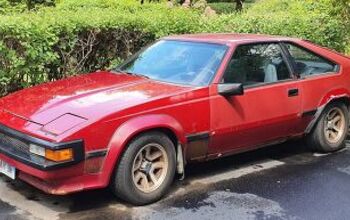Canadian Auto Sales More Numerous Than Ever in May 2017; Canadians Paid More Than Ever, Too
Canadian auto sales surged to record levels in May 2017, surpassing the previous monthly record from April of last year by an 8-percent margin and topping 200,000 units for just the second time in history.
You know it’s going well when, in a virulently anti-car market, passenger car sales increase, year-over-year. And in the fifth month of 2017, car sales did indeed improve, growing 3 percent beyond May 2016 levels.
You know it’s truly going well when, in a market that had already seen pickup truck market share climb to 20 percent, pickup truck sales jumped 38 percent to form 22 percent of the industry’s volume.
And you know it’s going exceptionally well when, in the span of just one month, the relatively small Canadian market purchases and leases 217,000 new vehicles at significantly higher prices than in the past.
According to Desrosiers Automotive Reports, Canada’s auto industry climbed above 200,000 sales for just the second time in history. Up 11 percent, year-over-year, Canadian sales improved by roughly 22,000 units despite outside-the-norm declines from BMW, Chrysler, Dodge, Jeep, and Volkswagen.
While losses at a handful of its brands — including a 30-percent dive at Jeep and a 25-percent downturn at Chrysler — clearly diminished some of its potential, Fiat Chrysler Automobiles still says the automaker sold more vehicles in May than ever before. FCA volume was up 5 percent to 33,186 units.
The Ford Motor Company led all automakers with 34,475 sales, a 17-percent year-over-year improvement that drove the company to its best May since 1989. General Motors’ 36-percent improvement to 31,149 sales produced the best May for GM since 2009, including the best month in Cadillac’s history. Record sales were a common theme at numerous other auto brands as well, from Audi to Honda to Porsche.
That incentives are high is not news to Canadian car buyers. According to J.D. Power figures revealed by Automotive News Canada, the average new vehicle discount in May 2017 measured $5,800, 2 percent higher than in May 2016.
But the typical new vehicle transaction price grew by roughly $1,400 in May 2017, driving the average transaction price up above $37,000.
Selling more vehicles, and selling them at a higher price? Automakers will take that. Not only are Canadians optioning up existing vehicles, but redesigned vehicles are arriving in Canada with base prices that reflect the weakening Canadian dollar. The 2018 Honda Odyssey, for instance, sees its MSRP rise 12 percent.
At the heart of the market, where affordability is key, the Ford F-Series — Canada’s leading line of vehicles — reported its second-best month ever in May. Ram P/U sales reached record levels, nearly catching the No.1 Ford. The Honda Civic, Canada’s top-selling car, was up 5 percent to 8,616 sales, 11 percent of all car sales. The Ford Escape, a historic Canadian favorite, reclaimed its old position and led all SUVs/crossovers thanks to a 26-percent jump to 5,397 sales.
Meanwhile, May’s extraordinary Canadian auto sales achievements, particularly in the light of steady incentives and rising ATPs, have led forecasters to increase their annual forecasts. Canadian auto sales reached record levels in each of the last four calendar years. Through the first five months of 2017, Canadian auto sales are up 5 percent.
If that rate of growth continues, Canadians will, for the first time ever, buy and lease more than 2 million new vehicles in 2017.
Timothy Cain is a contributing analyst at The Truth About Cars and Autofocus.ca and the founder and former editor of GoodCarBadCar.net. Follow on Twitter @timcaincars.
More by Timothy Cain
Latest Car Reviews
Read moreLatest Product Reviews
Read moreRecent Comments
- MaintenanceCosts "And with ANY car, always budget for maintenance."The question is whether you have to budget a thousand bucks (or euro) a year, or a quarter of your income.
- FreedMike The NASCAR race was a dandy. That finish…
- EBFlex It’s ironic that the typical low IQ big government simps are all over this yet we’re completely silent when oil companies took massive losses during Covid. Funny how that’s fine but profits aren’t. These people have no idea how business works.
- Ajla Goldman Sachs 🥂
- Rna65689660 DVR and watch all that are aired. Has been this way for 40 years.


































Comments
Join the conversation
Oh man, one of my first cars was a '77 Civic in that color combination...Alluvial Gold with brown woven vinyl seats, fake wood on the dash, 4 speed manual trans and dealer-installed A/C that didn't really work.
I too, find the "yesterday to today" differences striking. However, if Honda - or any car company - tried to sell a version of the earlier Civic today, the same B&B who wax poetic for the good ol' days would rip that car to shreds. Manual steering; Manual brakes; hand-crank windows? What were they thinking? And of course...WAAAYYY under-powered. I'm not going to even get into the raft of safety designs and features the earlier Civic does not possess. Yes, the 70s era Civic was a great car for its day...for its day. Doesn't mean it could be a viable car today. Heck, the Model T was a great car...for its day.